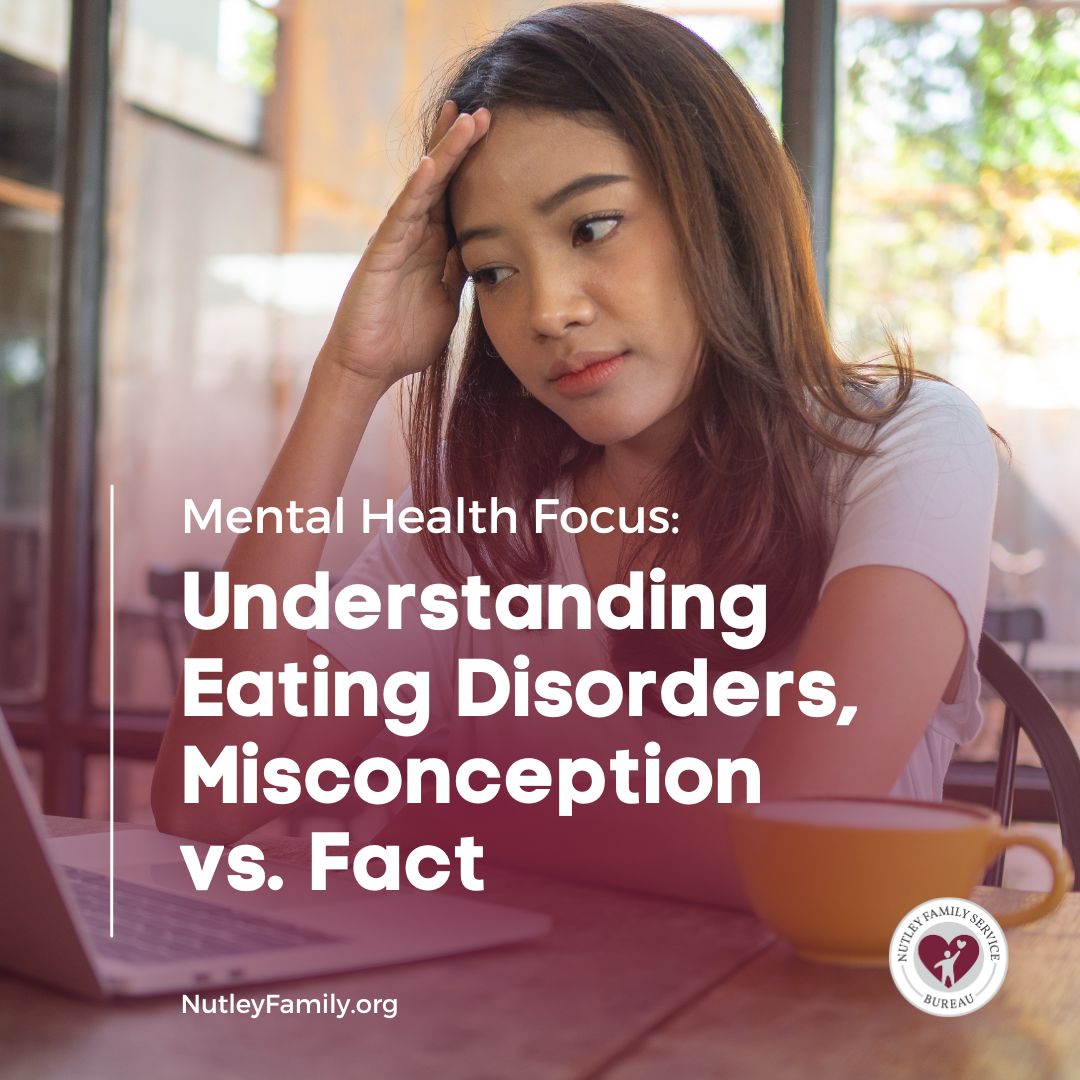-
Mental Health Focus: Understanding Eating Disorders, Misconception vs. Fact
- Posted on February 20, 2024
- by admin
- in All Articles, Mental Health, NFSB Blog
- Comments Off on Mental Health Focus: Understanding Eating Disorders, Misconception vs. Fact

The Mental Health Program at Nutley Family Service Bureau (NFSB) provides counseling and psychiatric services for individuals and families. New clients are welcome and immediate appointments are available. This article is part of an ongoing educational series focused on common mental health challenges, treatment techniques, and helpful tips.
Our culture is overly obsessed with weight and diet. Social media, TV shows, and magazines have contributed to this problem by creating unhealthy perceptions about the “ideal” body. Also, people might see online photos of a person who they haven’t spoken with in years and jump to the conclusion that they have an eating disorder.
The fact is that clinical eating disorders, which are very serious and can be life-threatening, are not as common as you may think. Greater awareness of what an eating disorder is and is not, as well as the causes and symptoms of eating disorders, can empower people to seek help for themselves or a loved one.
What is an eating disorder?
An eating disorder is a complex mental health disorder characterized by unhealthy eating habits, behaviors, thoughts, and feelings related to food and body image. Most people associate eating disorders with anorexia, which involves severe restriction of food consumption and fear of gaining weight, causing one to become dangerously underweight.
However, the most common eating disorder involves binge-eating. Unable to control their eating behaviors, people with binge-eating disorder consume large amounts of food in a short time. There is also bulimia, which is a combination of the two – binge eating followed by purging behaviors (vomiting, use of laxatives, intense exercise, etc.).
Eating disorders can lead to malnutrition, dehydration, damage to major organs, depression, anxiety, and other physical and mental conditions, or even death.
What are common misconceptions about eating disorders?
“Young women and teens get eating disorders.”
“Eating disorders can affect anyone, regardless of gender or age,” said NFSB Clinical Supervisor Kristen Petullo, MSW, LCSW, who has deep experience counseling individuals with eating disorders. “We’ve seen children as young as 7 years old and elderly adults struggling with eating disorders.”
“It’s a diet gone wrong when someone wants to be thin.”
Eating disorders aren’t just about food, weight, and body image. Although these are often contributing factors, eating disorders have emotional and psychological causes.
“She’s so thin. She must have an eating disorder.”There are many reasons why someone might appear thin that have nothing to do with an eating disorder. Also, a person with an eating disorder could appear to be living at a healthy weight or even overweight.
“She made that choice.”
Eating disorders are not conscious decisions and they can be very difficult to overcome. Blaming or shaming someone for their mental health disorder only makes the situation worse.
What causes eating disorders?
Although there are many underlying causes, weight and shape are typically at the crux of an eating disorder. However, an eating disorder can also be a coping mechanism.
“There’s an overevaluation of weight and shape and their impact on an individual’s self-worth,” Kristen said. “But it’s not always about food or looking a certain way. For many people, an eating disorder is their way of taking control of something when they don’t feel as if they’re in control of other areas of their life.”
What are the most common symptoms of eating disorders?
Restricting specific foods, food groups, or numbers of calories are common symptoms of an eating disorder. Obsession with healthy eating, withdrawal from social eating, compulsive exercise, and purging, like self-induced vomiting, are also signs of an eating disorder.
Psychologically, an individual with an eating disorder may have negative feelings and low self-esteem related to their own body, regardless of the actual size or shape. They may constantly check their weight and criticize the slightest imperfections in their appearance.
Fatigue, low energy, irritability, mood swings, and dehydration are also common and directly tied to the physical and psychological symptoms of eating disorders.
What should you do if you suspect you or a loved one has an eating disorder?
“If a parent is concerned about their child, I would always start with the pediatrician to discuss medical concerns,” Kristen said. “Pediatricians can often refer families for therapy. The National Eating Disorder Association is a great resource for adults and children with eating disorders and their loved ones.”
Have a conversation without blame or judgment. Share what you’ve observed instead of commenting on the person’s appearance. Spend time listening, gently express your concern, and offer your support.
Counseling can provide individuals with a safe space to discuss their feelings, what’s happening in their lives, and unhealthy behaviors related to food and body image. A therapist can also recommend nutrition counseling or a higher level of care and reduce the client’s fears about receiving that care.
“Most importantly, I want to encourage people to feel comfortable asking for help,” Kristen said. “Reducing shame and judgment around an eating disorder is important because we never want to say things that would prevent someone from seeking help.
Eating Disorders Awareness Week, held this year from February 26 – March 3, is an annual campaign to educate and engage the public about eating disorders and support those who are affected by eating disorders. We encourage you to get involved with increasing awareness for yourself and others!
If you or someone you know is showing symptoms of an eating disorder, we’re here to help. Schedule an appointment at NFSB. New clients are welcome and immediate appointments for mental health counseling are available. We’ll always respect your privacy. Call 973-667-1884 extension 1.
If you enjoyed this article please consider sharing it!

















